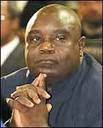Laurent Desire Kabila (November 27, 1939- January 18, 2001)
On May 17, 2010 the Democratic Republic of the Congo marked the May 17, 1997 end of 32 years of the Mobutu dictatorship, and the coming to power of Laurent Kabila. Kabila’s change — or call it “revolution” — raised Congolese expectations to the point that he was unable to meet those expectations. It is said in marketing that raised expectations are often difficult to lower. What is happening in Eastern Congo is the unintended consequences of this unlearned principle. Laurent Kabila is the deceased father of the current Congolese president, Joseph Kabila.
In 1965 the major Congolese rebel leaders such as Soumialot in Kisangani abandoned their two-year efforts to pursue war in Congo and decided to join Mobutu, who took power in Kinshasa in November 1965. Kabila, however, remained in South-Kivu Province and then moved to Tanzania, East Africa, where he remained from 1964 to 1996. He began launching hit and run attacks in Eastern Congo mainly in Fizi, South Kivu province with what is known today as the Mayi Mayi or “freedom fighters”.
Che Guevara and other Cuban revolutionaries had come to rescue and support his movement, but for reasons which remain unclear, they left after a relatively brief period of engagement.
Kabila faced the great challenge of bringing change, becoming the agent of change, creating a critical mass to maintain momentum, and producing results in a country which was not yet a Nation-State. The lesson here is that anytime a game changer cannot control the game, he or she will lose. Kabila could have benefitted from Jesus’ remarks on wine and wineskins: “And no one puts new wine into old wineskins; otherwise the new wine will burst the skins and will be spilled, and the skins will be destroyed. But new wine must be put into fresh wineskins. And no one after drinking old wine desires new wine, but says, “The old is good.” ’ Because he lacked this wisdom, a context of horror emerged barely a year after his so-called revolution, that will be his legacy felt for many generations, unless somehow it can be cured in Congo’s collective memory.
The Eastern Congo where the Kabila movement of change started is not where one finds peace, justice and development. Instead it has become a part of DR Congo where victims of ill-fated changes have become perpetrators, part of the country where insecurity, violence, and the rape of women and girls remain terrible local, national and regional threats.

